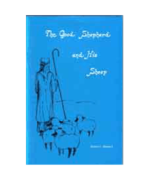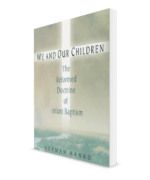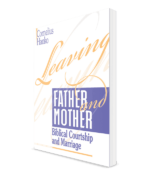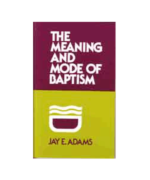Many books concerning the place of women in the kingdom of God are negative. Women may not preach; women may not be elders; women may not be deacons. This book, however, seeks to do more than affirm that women are excluded from the special offices of the church. Their positive contribution, a vital one, an indispensable one is set forth.
Far Above Rubies extols God-fearing women and underlines their importance. Without godly and pious women the Church could not survive. Infected by feminism, many in the professing church-world view the work of the home as “an intolerable bore” (p. 136). However, as the book points out, “the Scriptures do not present it that way. The Scriptures speak rather of the fact that there are few, if any, callings in all of life that are more noble than the calling [of] Christian mothers” (p. 136). Bringing forth children was the hope of Old Testament women, because they believed that the Seed of the women (Gen. 3:15) would bring salvation: they longed to bring forth the Christ. That is why women like Jehosheba (II Chron. 22:11) risked life-and-limb to save the seed royal during the dark days of godless Athaliah; that is why Hannah poured out her heart for a son during the apostate days of the judges (I Sam. 1:11). New Testament women bring forth the church, future members of Christ’s body.
One contributor describes the role of covenant mothers as “shaking Satan’s kingdom” because “there is no sound more grating to the ears of Satan than the groans of mothers bringing forth the true Israel. In that cry he does not gloat. Who knows what these little ones will grow up to be and how they will withstand his kingdom!” (p. 80).
Feminists claim that Christians and the Bible are “against” women, because the Bible does not allow women to hold special offices in the Church. Far Above Rubies demonstrates that only the biblical position is for women’: “the Bible has the woman’s own best interests in view, and prescribes what is best for the woman herself” (p. 158). Office-bearers are not lords over God’s people (I Pet. 5:3), rather “to occupy a place of authority means very, very simply that you be a slave to God’s people, the lowliest of slaves to God’s people” (p. 133) so the idea that forbidding women office is to treat them as inferiors is mistaken. Another contributor reminds us that the Bible is “very concerned to guard against the headship of the man being interpreted to justify a harsh, tyrannical, domineering rule of the man over the woman” (p. 159). Facing the objections head-on, he dismisses as ridiculous and a mere emotional appeal the argument that not to ordain women is to waste their gifts, and he issues this challenge to those who believe the Bible is culturally-conditioned: “Do you suppose for one minute that the Lord Jesus would allow Himself to be pressured by the cultural situation of His day? Did He ever cave in to the prejudices and wrongs of the culture of His day?” (p. 169) Such a rhetorical question ought to silence all objection. At stake is the doctrine of Scripture.
There is also practical advice on finding a godly woman and maintaining a godly marriage: “Young men even in the church often look only for a woman with physical attractiveness and charm. And if a girl lacks what the advertisers are looking for in a ‘cover girl’, even if she is marked by godliness and the fear of the Lord, then many young men in the church look away from her. Who is looking for a virtuous woman? I warn you, if you look for less, then the Lord may well give you what you are looking for, and you can spend a life-time learning that ‘favour is deceitful and beauty is vain.’ How many men are there, even in the church, whose lives are a little bit like hell, because God gave them that pretty she-devil that they were seeking?” (p. 8). This is the stark warning to young men in the church.
The daughters of Sarah, therefore, ought not to envy the godless women of the world, for “generally speaking there has never been a more troubled, dissatisfied, unhappy and ungodly woman than the modern emancipated American woman” (p. 66), writes one contributor. Rather they ought to find satisfaction and fulfilment in their God-given role. The Proverb says of the virtuous woman, “Her children rise up, and call her blessed; her husband also, and he praiseth her” (31:28). Thus this book will also encourage the men of the church to bless God for their godly wives, mothers and sisters.
REVIEW
Far Above Rubies: Today’s Virtuous Woman, edited by Herman Hanko; Reformed Free Publishing Association, 1992; 187 pp., paperwork. [Reviewed by Rev. Dale H. Kuiper.]
The1atest offering of the RFPA is a compilation of eleven sermons, speeches, pamphlets, and magazine articles by five ministers and three professors from the Protestant Reformed Churches. Editor Hanko has also included four articles of charming simplicity by Abraham Kuyper from his popular book, When Thou Sittest in Thine House. As the subtitle of the book indicates, the subject of all this writing is the woman, more particularly, today’s “virtuous woman.”
Several words come to mind as one reads through these chapters: timely, biblical, consistent, practical, and positive. Timely because the place of the woman in marriage, the home, the church, and society needs definition today. Biblical because only God may, can, and does define these important roles. Consistency is itself a ruby because it is rare that across a denomination and its seminary a unified, certain sound is sent forth. The great need is for the practical application of the Scriptural givens, so that a woman’s daily problems are addressed and she knows where to turn and how to behave. Believing women are not only informed what they are not to be doing, but are in every chapter encouraged positively in the calling whereunto God calls them. A few chapter headings will whet the appetite: “A Virtuous Woman,” “Children in Marriage,” “The Calling of the Truly Liberated Woman,” “Women in Church Office.”
A couple of criticisms come to mind. Perhaps it is inevitable with a compilation such as this that there is a degree of overlapping or repetition in the articles. In several chapters the same biblical passages are treated, identical arguments are made, and the same examples employed. While this results in some reinforcement of the reader in the biblical positions, it does become tedious if several chapters are read in one sitting. Perhaps it would be best to read the book over a period of time.
The second matter that we question is the elevating of the place and work of the woman to such exalted heights that the labors of others are made all but insignificant. For example, the work of “mothers in the home is an everlasting work. From a certain point of view, it is the only work that will ever endure” (p. 72). The work of artists and craftsmen, etc., will not endure; “there is one great work that will not be removed, but shall endure, and that is the life of the child who has been formed and molded by believing hands” (p. 82). We are of the conviction that all the labors of every child of God are kingdom labors, that none of them are in vain, and, that God is faithful to reward every one of them in time and in eternity. Among those labors of the faithful are those performed by believing women in the home. With the thoughts that a mother’s work is of great significance, and that the work is one which only she can perform, we heartily concur!
This book ought to be in every Christian home. The older girls and young women should read it to learn what they are called by God to be. The older women should read it to discover what they should be teaching by word and example. The young men must read these things to know what to look for in a wife. The older men should also read it, that they might know what to guard against and what to stand for in the home and church. A profitable book, then; one that the Holy Spirit will surely use to bring forth fruit in the home and in the church of Gods Son.









